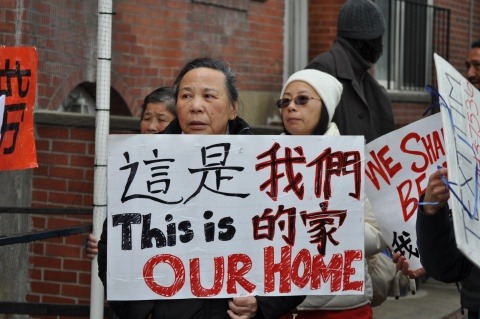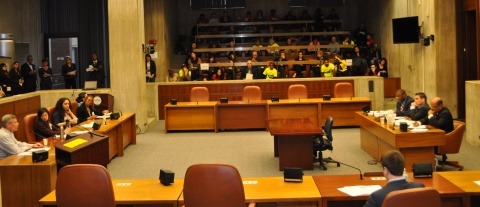Residents Call for Just Cause Eviction Policy

April 12, 2015
BOSTON (April 8, 2015) – “Up with the wages, down with the rents!” rang the shouts of tenants and community activists as they marched into City Hall Plaza this afternoon. Led by tenants who have been forced out of their homes by speculative developers, the march began on Hudson Street in Chinatown, where protesters called on First Suffolk LLC to halt its acquisition of historic brick row houses that threatens to displace low income immigrant families. Chinatown has experienced skyrocketing real estate values following the addition of nearly 3,000 luxury units in the past 15 years.
Pei Ying Yu, an elderly tenant displaced from her Hudson Street apartment, broke into tears as she described the ordeal of being forced from her home after the building was purchased by First Suffolk LLC. “All we want is to return to our home,” said Yu.
Arriving at City Hall Plaza, speakers included tenants, foreclosed homeowners, and community leaders from Jamaica Plain, East Boston, Roxbury, Dorchester and Mattapan, who called for new policy solutions to the displacement crisis. Over 300 people next moved indoors to pack a city council hearing on displacement, community stability and neighborhood preservation, sponsored by Boston city councilor Tito Jackson.

Maria Christina Blanco of City Life/Vida Urbana said that both tenants and homeowners feel the effects of displacement, as their families are priced out of the neighborhoods they grew up in.
“We are here to talk about Just Cause Eviction paired with mediation to prevent displacement,” said Blanco. “There should be a specific reason for eviction, and there should be support for owners that keep rents affordable.”
Kadineyse Peña of the Boston Tenant Coalition called for increased developer payouts under the city’s Inclusionary Development Program and for targeting resources to low and moderate income Bostonians most threatened with displacement.
“Rents keep going up, but wages have been stagnant,” said Peña, citing a Brookings Institution study that placed Boston third in a ranking of major US cities with growing income inequality gaps. “Developers are making huge profits and need to pay their fair share.” Others noted that a real estate transfer tax on luxury sales has brought more than $100 million in new revenues to San Francisco.
Several speakers called for neighborhood stabilization zones around new transit nodes and in rapidly gentrifying areas like Chinatown or East Boston. Harry Smith of the Dudley Street Neighborhood Initiative promoted Community Land Trusts as a model for stabilizing neighborhoods and promoting development without displacement.
“Community land trusts are a proven model. It’s time once again to take a stand and own the land across the city,” said Smith.
Check out the powerful video about displacement that showed at th City Council Hearing, “Losing Home: Displacement in Boston”